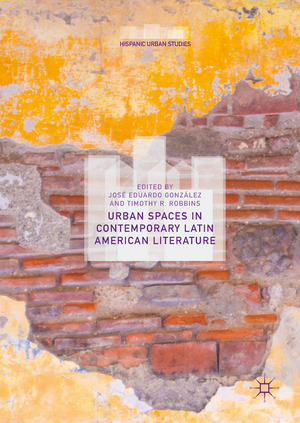Urban Spaces in Contemporary Latin American Literature: Hispanic Urban Studies
Editat de José Eduardo González, Timothy R. Robbinsen Limba Engleză Hardback – 12 iul 2018
| Toate formatele și edițiile | Preț | Express |
|---|---|---|
| Paperback (1) | 635.47 lei 6-8 săpt. | |
| Springer International Publishing – 12 ian 2019 | 635.47 lei 6-8 săpt. | |
| Hardback (1) | 640.71 lei 6-8 săpt. | |
| Springer International Publishing – 12 iul 2018 | 640.71 lei 6-8 săpt. |
Preț: 640.71 lei
Preț vechi: 753.77 lei
-15% Nou
Puncte Express: 961
Preț estimativ în valută:
122.62€ • 126.67$ • 102.05£
122.62€ • 126.67$ • 102.05£
Carte tipărită la comandă
Livrare economică 25 martie-08 aprilie
Preluare comenzi: 021 569.72.76
Specificații
ISBN-13: 9783319924373
ISBN-10: 3319924370
Pagini: 264
Ilustrații: IX, 219 p.
Dimensiuni: 148 x 210 x 23 mm
Greutate: 0.43 kg
Ediția:1st ed. 2019
Editura: Springer International Publishing
Colecția Palgrave Macmillan
Seria Hispanic Urban Studies
Locul publicării:Cham, Switzerland
ISBN-10: 3319924370
Pagini: 264
Ilustrații: IX, 219 p.
Dimensiuni: 148 x 210 x 23 mm
Greutate: 0.43 kg
Ediția:1st ed. 2019
Editura: Springer International Publishing
Colecția Palgrave Macmillan
Seria Hispanic Urban Studies
Locul publicării:Cham, Switzerland
Cuprins
1. The Spatial Turn and Twenty-First Century Latin American Fiction (José Eduardo González).- 2. Beyond the Ruins of the Organized City: Urban Experiences through the Metro in Contemporary Mexican Literature (Liesbeth François).- 3. Spectral Spaces: Haunting in the Latin American City (Marta Sierra).- 4. A Tale of Three Cities. Urban Space in the Crack Novels (1995-97) (Tomás Regalado López).- 5. The Night That Repeats Itself: Social Dystopia in Managua, Salsa City (¡Devórame otra vez!), by Franz Galich (Magdalena Perkowska).- 6. Urban Debris and Networking Imperialism in Un Arte de hacer ruinas by Antonio José Ponte (Eduard Arriaga).- 7. Place Making in the Solitude of the City: Valeria Luiselli's Los ingrávidos (Cecily Raynor).- 8. Dislocated Subjects in the Global City: Santiago Gamboa’s Hotel Pekín (Camilo A. Malagón).- 9. Roberto Bolaño’s Urban Labyrinths: The City as Metaphor for the Silent Universe (Juan Pablo Melo).- 10. The Tourist Aesthetic and Empire in Rodrigo Fresán’s Mantra and Jardines de Kensington (Timothy R. Robbins).
Notă biografică
José Eduardo González is Associate Professor of Spanish and Ethnic Studies at the University of Nebraska-Lincoln, USA. He is author of Appropriating Theory: Ángel Rama’s Critical Work (2017).
Timothy R. Robbins is Associate Professor of Spanish at Drury University, USA. He is co-author of Pop Culture in Latin America and the Caribbean (2015). He co-edited, with José Eduardo González, New Trends in Latin American Narrative: Post-National Literatures and the Canon (Palgrave, 2014), a collection of critical essays on recent Latin American fiction.
Timothy R. Robbins is Associate Professor of Spanish at Drury University, USA. He is co-author of Pop Culture in Latin America and the Caribbean (2015). He co-edited, with José Eduardo González, New Trends in Latin American Narrative: Post-National Literatures and the Canon (Palgrave, 2014), a collection of critical essays on recent Latin American fiction.
Caracteristici
Interrogates connections between transformation of urban space in the last three decades and the new modes of writing fiction in Latin America Assesses how global and transnational components are incorporated into Latin American literature and culture Questions whether or not depictions of a new kind of city require new aesthetic projects









